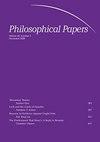公共厌恶的私人宇宙学
IF 1.3
3区 哲学
0 PHILOSOPHY
引用次数: 0
摘要
正如Raymond Geuss所指出的,神圣与公共和私人一样,可以代表第三种社会政治制度。现代自由主义的公共/私人分歧代表了一种历史反常现象,神圣的东西被认为是私人领域的。然而,最近对厌恶及其对道德心理学影响的实证研究让人怀疑,这些计划实际上在多大程度上将与神圣有关的现象从公共领域中消除了。在这篇论文中,我主张厌恶和仪式污染概念之间的连续性,展示了对后一种现象的道德心理的理解如何有助于解释我们表面上世俗的公共领域的某些方面。在这些方面,我主要关注种族主义,特别是当代美国和英国个人对种族主义的厌恶。我认为,仪式污染的想法表明,这种反应表明了支持厌恶的社会道德制度的一些潜在缺陷,而这些缺陷反过来又有可能限制消除种族主义的社会努力。我的结论是,这种社会道德厌恶除了具有上述工具性缺陷外,在重要方面本身在道德上也是值得怀疑的。本文章由计算机程序翻译,如有差异,请以英文原文为准。
The Private Cosmology of Public Disgust
Abstract Alongside the public and private, the sacred can represent a third social-political dispensation, as Raymond Geuss notes. The modern liberal public/private divide represents a historical anomaly, with the sacred putatively consigned to the private realm. However, recent empirical research into disgust and its influences on moral psychology casts doubt on the extent to which such schemes have in fact removed phenomena connected with the sacred from the public realm. In this paper, I argue for the continuity between disgust and the idea of ritual pollution, demonstrating how an understanding of the moral psychology of the latter phenomenon helps account for certain aspects of our ostensibly secular public realm. Of these aspects, I focus primarily on racism, and specifically individuals’ avowals of disgust in response to racism in the contemporary USA and UK. I argue that the idea of ritual pollution shows that such a response indicates a number of potential drawbacks to the socio-moral scheme underpinning the disgust, which in turn have the potential to limit social efforts to eradicate racism. I conclude that such socio-moral disgust is itself morally questionable in important ways, in addition to having the aforementioned instrumental shortcomings.
求助全文
通过发布文献求助,成功后即可免费获取论文全文。
去求助
来源期刊

Philosophical Papers
PHILOSOPHY-
CiteScore
2.10
自引率
0.00%
发文量
18
期刊介绍:
Philosophical Papers is an international, generalist journal of philosophy edited in South Africa Original Articles: Articles appearing in regular issues are original, high-quality, and stand-alone, and are written for the general professional philosopher. Submissions are welcome in any area of philosophy and undergo a process of peer review based on initial editor screening and refereeing by (usually) two referees. Special Issues: Topic-based special issues are comprised of both invited and submitted papers selected by guest editors. Recent special issues have included ''Philosophy''s Therapeutic Potential'' (2014, editor Dylan Futter); ''Aging and the Elderly'' (2012, editors Tom Martin and Samantha Vice); ''The Problem of the Criterion'' (2011, editor Mark Nelson); ''Retributive Emotions'' (2010, editor Lucy Allais); ‘Rape and its Meaning/s’ (2009, editor Louise du Toit). Calls for papers for upcoming special issues can be found here. Ideas for future special issues are welcome.
 求助内容:
求助内容: 应助结果提醒方式:
应助结果提醒方式:


